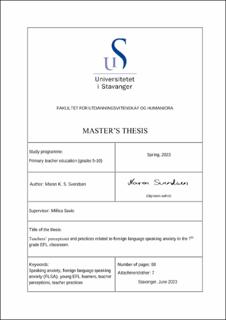| dc.description.abstract | Even though Norwegian learners tend to have a high proficiency in English, they still tend to be anxious in English-speaking contexts. Hence, the present master’s thesis set out to investigate teachers’ perceptions and reported practices related to foreign language speaking anxiety (FLSA) among Norwegian 7th grade learners in the English as a Foreign Language (EFL) classroom. FLSA refers to the discomfort and apprehension experienced when engaging in a communicative foreign language situation (Horwitz et al., 1986, p. 127). Two research questions were developed in relation to the study. The first research question focused on teachers’ perceptions of FLSA among learners. The second research question examined teachers’ practices and reported practices aiming to prevent and reduce FLSA among 7th grade learners. Based on these research questions, it was seen as appropriate to collect data through semi-structured interviews and observation. Three experienced teachers that were currently teaching English in 7th grade at different schools, participated in the present study. Each participant was observed during one English lesson and interviewed.
The present study attempted to investigate the current gap in Norwegian research regarding teachers’ perceptions and practices related to FLSA. Speaking anxiety in the EFL classroom has been researched to a large extent in other countries around the world for many years; however, this is still a phenomenon learners encounter and an issue for teachers to handle to scaffold these learners. The thesis provided implications for teaching and suggestions for future research, such as investigating how digital tools can contribute to reduced FLSA.
The main findings from data analysis revealed how the teachers recognise FLSA among their learners, and factors they believed influenced FLSA. The three teachers mainly shared similar perceptions and reported practices in the EFL classroom. The teachers reported that they identified learners with speaking anxiety by observing behavioural patterns and body language when learners encountered anxiety-provoking situations. Regarding the factors that influence FLSA, current results indicated that teachers believed professionally qualified English teachers to be a factor that could reduce speaking anxiety because of their pedagogical approaches. According to the teachers, another factor influencing FLSA is the established classroom environment, such as predictable routines and structures, the way learners are grouped, and mutual respect between learners. It was revealed that teacher-learner and learner-learner relations are greatly impacted because learners tend to become insecure in 7th grade. The last factor that could influence FLSA was the high level of fluency of some learners, causing insecurity in other learners prone to FLSA.
Concerning the second research question, present findings demonstrated that there were numerous suggestions for specific teaching strategies to incorporate in the EFL classroom to reduce and prevent FLSA. These strategies include different ways to scaffold and support learners in the EFL classroom. The main strategies include gradual adaptation to oral presentations, reading aloud, cooperation with parents, using games and songs, regularly utilising group work, establishing predictable routines, incorporating interesting topics in activities, and using digital tools. | |
